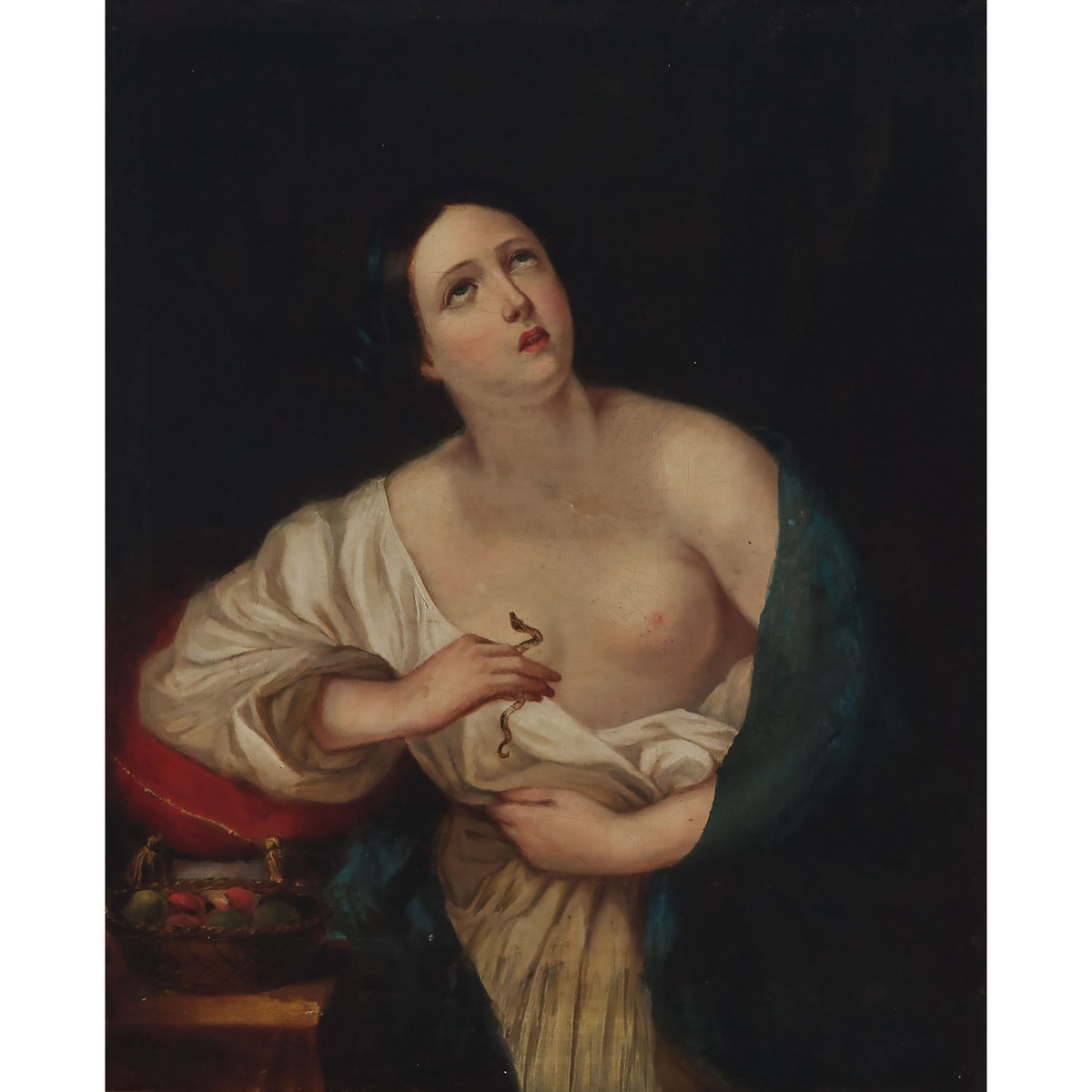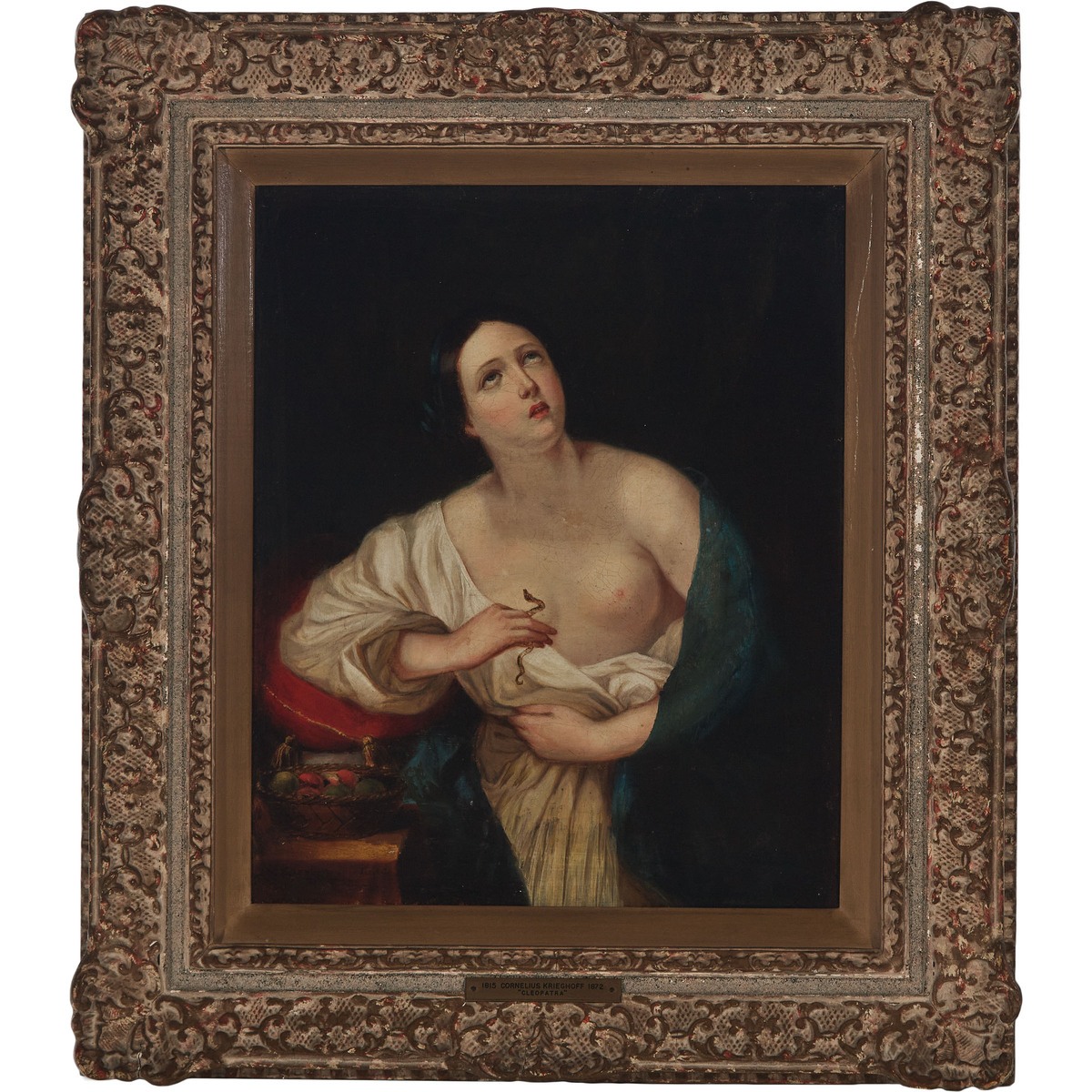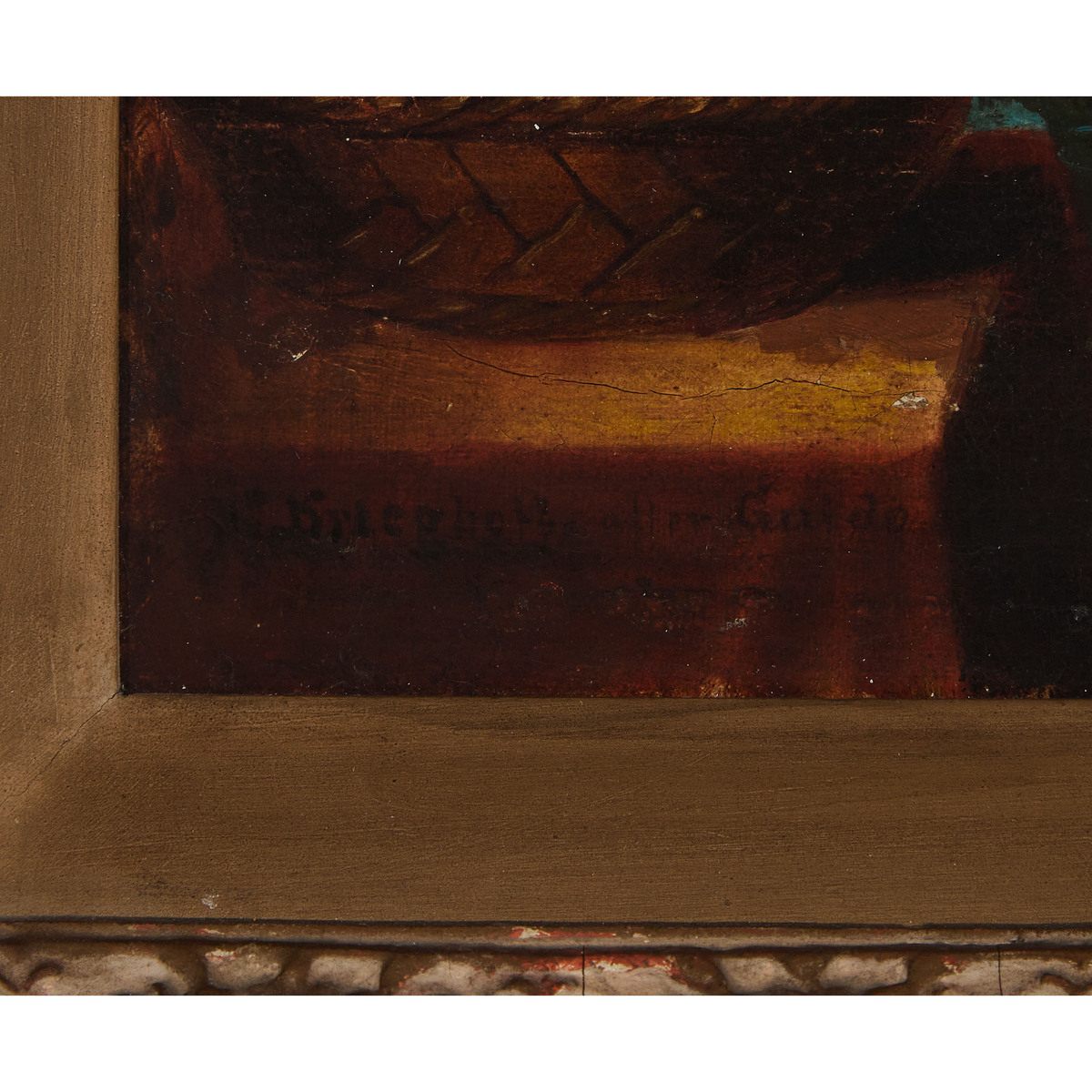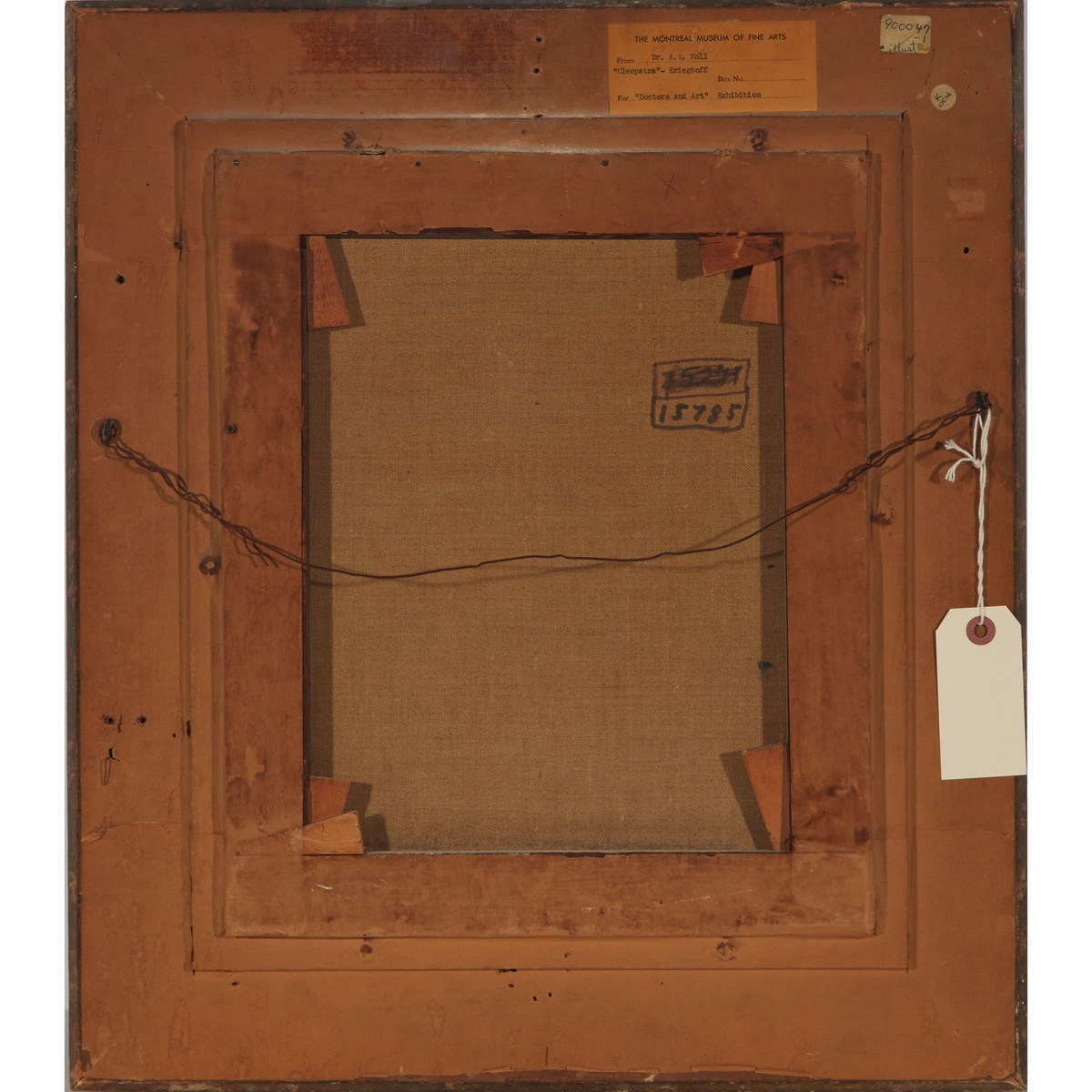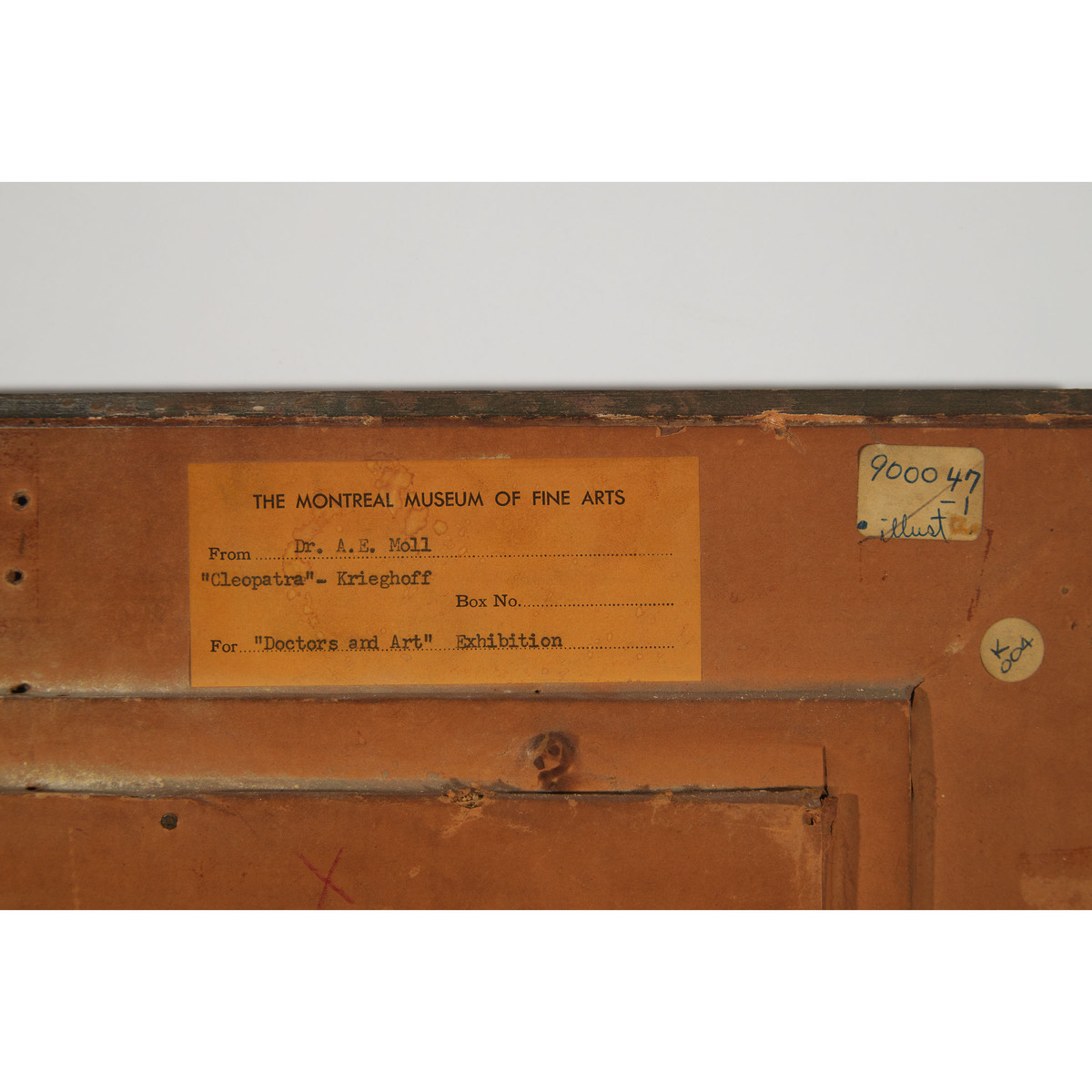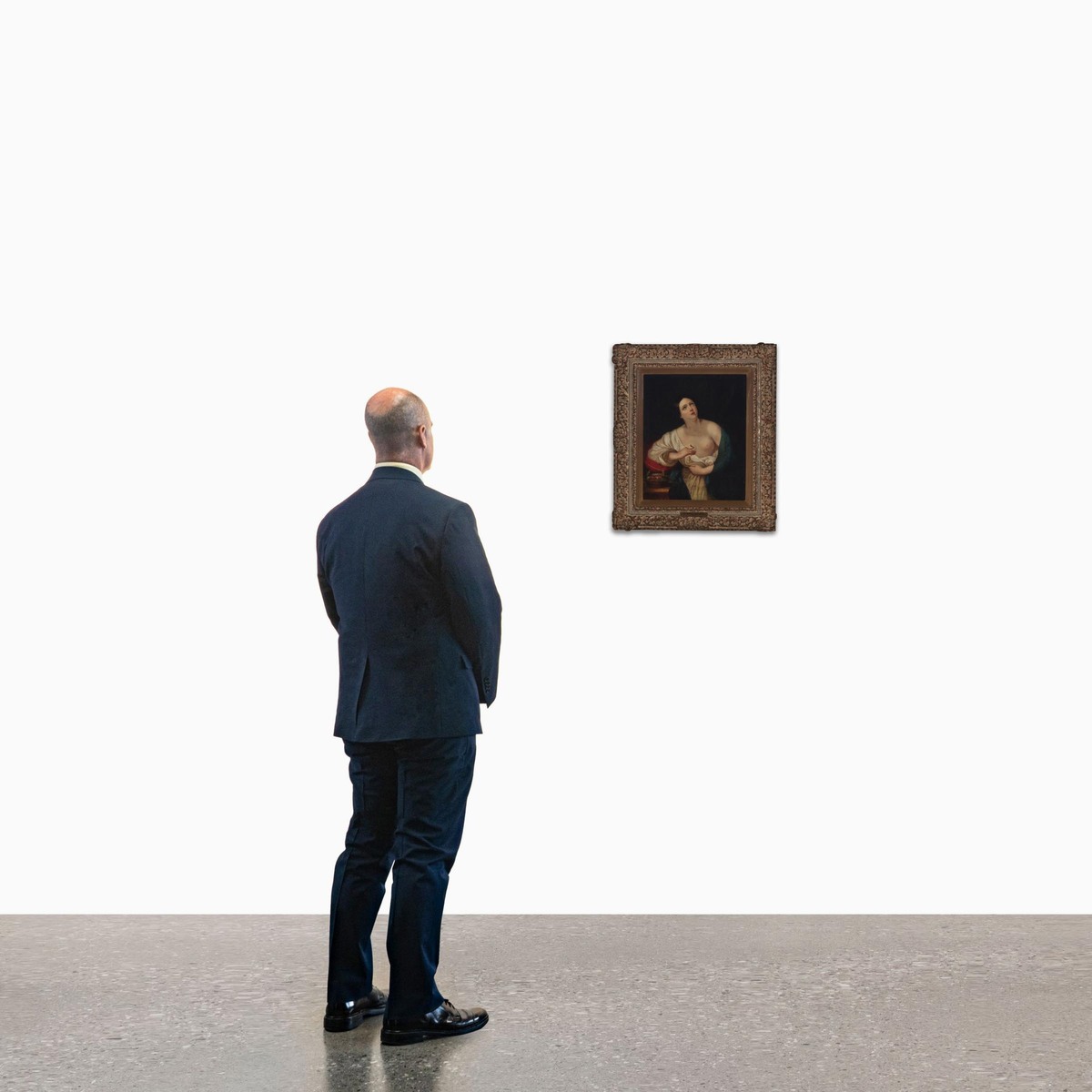62
Cornelius David Krieghoff (1815-1872), Canadian, after Guido Reni (1575-1642), Italian, CLEOPATRA, o
CLEOPATRA
oil on canvas
signed "Krieghoff" and inscribed "After Guido"
15 x 12.375 in — 38.1 x 31.4 cm
Provenance:
Dr. Albert E. Moll, Montreal, QC;
Sotheby's Canada in association with Ritchies, Toronto, ON, 11 Nov 1980, lot 122;
The Pagurian Collection, Toronto, ON;
Collection of Sir Christopher and Lady Ondaatje
Exhibited:
Doctors and Art, Montreal Museum of Fine Arts, Montreal, QC, 7 Jun-4 Jul 1961.
Literature:
Robert Ayre, “Those Acquisitive Doctors,” Montreal Star (Montreal, QC, 10 Jun 1961).
Pioneers of Canadian Art: The Pagurian Collection, 1981/1982, (Toronto: Pagurian Press, 1981), 8 no. 92.
Note:
Krieghoff left Canada in 1863, relocating to Europe for seven years. His paintings and household effects were put up for sale in 1862, including his extensive library of over 1200 volumes. The Toronto Globe noted that the artist intended “to reside in Italy or France,” though details of his actual stay in Europe remain unclear. Dennis Reid suggests that Krieghoff spent time in Paris and Munich, and very likely in London. (1)
Italian Baroque artist Guido Reni (1575-1642) made at least six known paintings of Cleopatra’s suicide by asp, which are included in the collections of the Museo Capitolino, Rome, the Prado, Madrid, the Royal Collection, London, and the Pitti Palace, Florence. Of these versions, Krieghoff’s Cleopatra is most closely aligned with the latter. While it is possible that Krieghoff travelled to Florence and saw it in situ, it is more likely that he copied it from a photograph. An 1870 albumin silver print by V. Jacquier in the collection of The National Gallery of Canada depicts the exact Reni Cleopatra painting, making the photograph and the painting close contemporaries. Krieghoff was known to work from photographs, and indeed during his European sojourn a few years prior, he had made several paintings based on the photographs of William Notman. (2)
In comparing the Pitti Cleopatra with Krieghoff’s version, the main differences are those of colouration—cushions, drapery—rather than composition. Reni’s cool-toned original uses minimal red, and what little he does is used sparingly to highlight the heroine’s anguished face. In this restraint, Reni is able to imply that life is quite literally draining from her dying flesh, as if before our eyes. In contrast, Krieghoff loaded his palette with red, painting Cleopatra’s skin with fleshy gusto—an earthy departure from the Reni original.
However, the strongest argument for Krieghoff’s version being painted from a black-and-white photograph lies in the basket to the bottom left corner. Krieghoff chose a bright crimson pigment to paint the fruit, a shade not aligned to the reality of any known fig variety. Krieghoff cared about verisimilitude in his work—one need only look at his paintings of various First Nations costumes for proof—and it seems unlikely that a mere flight of fancy would prompt him to take great botanical liberties in a copied work. It is more realistic that Krieghoff, who spent most of his life in the chillier climes of Northern Europe, Canada and the northern United States, had in fact never seen a fig, nor had the people to whom the painting would be sold. Fruits that Krieghoff might have seen were modest and most likely red or reddish: wild berries or apples, the latter which had been cultivated in Canada since the 17th century. In the absence of a colour photograph or the original, Krieghoff took a guess and painted what he knew, and in so doing, gifted us with a much more Canadian Cleopatra.
(1) Dennis Reid, Krieghoff: Images of Canada, (Toronto: Douglas & McIntyre, 1999), 94.
(2) Reid, 95.
Estimate: $5,000—8,000
CLEOPATRA
oil on canvas
signed "Krieghoff" and inscribed "After Guido"
15 x 12.375 in — 38.1 x 31.4 cm
Provenance:
Dr. Albert E. Moll, Montreal, QC;
Sotheby's Canada in association with Ritchies, Toronto, ON, 11 Nov 1980, lot 122;
The Pagurian Collection, Toronto, ON;
Collection of Sir Christopher and Lady Ondaatje
Exhibited:
Doctors and Art, Montreal Museum of Fine Arts, Montreal, QC, 7 Jun-4 Jul 1961.
Literature:
Robert Ayre, “Those Acquisitive Doctors,” Montreal Star (Montreal, QC, 10 Jun 1961).
Pioneers of Canadian Art: The Pagurian Collection, 1981/1982, (Toronto: Pagurian Press, 1981), 8 no. 92.
Note:
Krieghoff left Canada in 1863, relocating to Europe for seven years. His paintings and household effects were put up for sale in 1862, including his extensive library of over 1200 volumes. The Toronto Globe noted that the artist intended “to reside in Italy or France,” though details of his actual stay in Europe remain unclear. Dennis Reid suggests that Krieghoff spent time in Paris and Munich, and very likely in London. (1)
Italian Baroque artist Guido Reni (1575-1642) made at least six known paintings of Cleopatra’s suicide by asp, which are included in the collections of the Museo Capitolino, Rome, the Prado, Madrid, the Royal Collection, London, and the Pitti Palace, Florence. Of these versions, Krieghoff’s Cleopatra is most closely aligned with the latter. While it is possible that Krieghoff travelled to Florence and saw it in situ, it is more likely that he copied it from a photograph. An 1870 albumin silver print by V. Jacquier in the collection of The National Gallery of Canada depicts the exact Reni Cleopatra painting, making the photograph and the painting close contemporaries. Krieghoff was known to work from photographs, and indeed during his European sojourn a few years prior, he had made several paintings based on the photographs of William Notman. (2)
In comparing the Pitti Cleopatra with Krieghoff’s version, the main differences are those of colouration—cushions, drapery—rather than composition. Reni’s cool-toned original uses minimal red, and what little he does is used sparingly to highlight the heroine’s anguished face. In this restraint, Reni is able to imply that life is quite literally draining from her dying flesh, as if before our eyes. In contrast, Krieghoff loaded his palette with red, painting Cleopatra’s skin with fleshy gusto—an earthy departure from the Reni original.
However, the strongest argument for Krieghoff’s version being painted from a black-and-white photograph lies in the basket to the bottom left corner. Krieghoff chose a bright crimson pigment to paint the fruit, a shade not aligned to the reality of any known fig variety. Krieghoff cared about verisimilitude in his work—one need only look at his paintings of various First Nations costumes for proof—and it seems unlikely that a mere flight of fancy would prompt him to take great botanical liberties in a copied work. It is more realistic that Krieghoff, who spent most of his life in the chillier climes of Northern Europe, Canada and the northern United States, had in fact never seen a fig, nor had the people to whom the painting would be sold. Fruits that Krieghoff might have seen were modest and most likely red or reddish: wild berries or apples, the latter which had been cultivated in Canada since the 17th century. In the absence of a colour photograph or the original, Krieghoff took a guess and painted what he knew, and in so doing, gifted us with a much more Canadian Cleopatra.
(1) Dennis Reid, Krieghoff: Images of Canada, (Toronto: Douglas & McIntyre, 1999), 94.
(2) Reid, 95.
Estimate: $5,000—8,000
Canadian, International, and Inuit Art
Ends from
Venue Address
For Waddington's delivery information please telephone +1 4165049100.
Important Information
Bidding for this sale will take place entirely online on Waddingtons Online Auction Platform
Waddington’s charges a buyer’s premium of 23% on the hammer price up to and including $25,000 CAD. Hammer prices in excess of $25,000 CAD will be charged a buyer’s premium of 20%. Payment for purchases is accepted in Canadian dollars by cash, certified cheque drawn on a Canadian bank, travelers cheque, bank draft or transfer, Visa or Mastercard within 10 days from the date of the sale.
Terms & Conditions
Terms and conditions:
1. All lots are sold “AS IS”. Any description issued by the auctioneer of an article to be sold is subject to variation to be posted or announced verbally in the auction room prior to the time of sale. While the auctioneer has endeavoured not to mislead in the description issued, and the utmost care is taken to ensure the correct cataloguing of each item, such descriptions are purely statements of opinion and are not intended to constitute a representation to the prospective purchasers and no warranty of the correctness of such description is made. An opportunity for inspection of each article is offered prior to the time of sale. No sale will be set aside on account of lack of correspondence of the article with its description or its reproduction, if any, whether colour or black & white. Some lots are of an age and/or nature which preclude their being in pristine condition and some catalogue descriptions make reference to damage and/or restoration. The lack of such a reference does not imply that a lot is free from defects nor does any reference to certain defects imply the absence of others. Frames on artwork are not included as part of purchase or condition. It is the responsibility of prospective purchasers to inspect or have inspected each lot upon which they wish to bid, relying upon their own advisers, and to bid accordingly.
2. Each lot sold is subject to a premium as part of the purchase price as per below:
Live and Online Auctions
(excluding Canadian Fine Art, Inuit Art, The Art of Canada and Fine Wine & Spirits Auctions)













